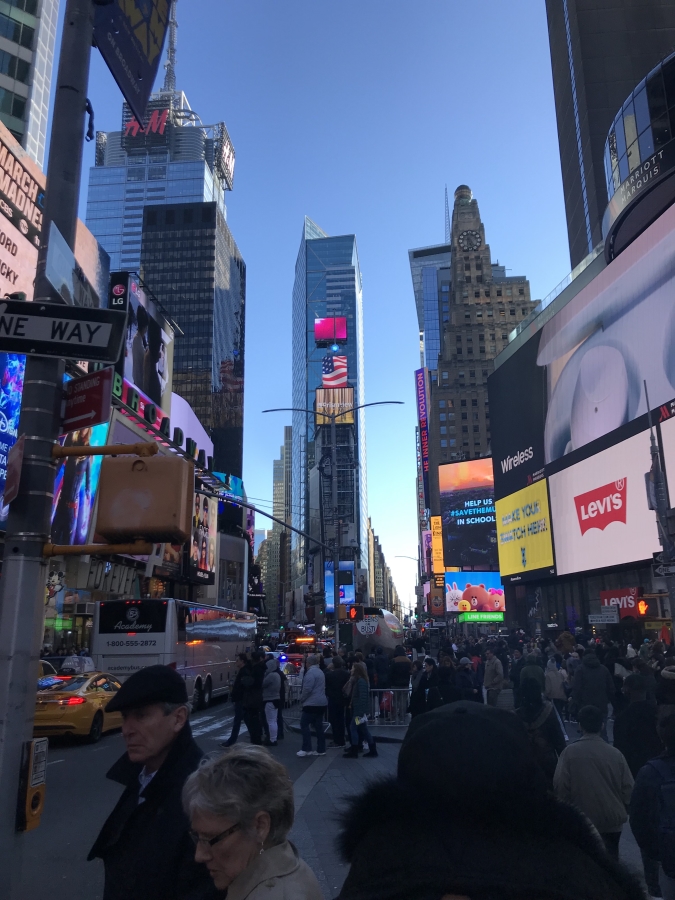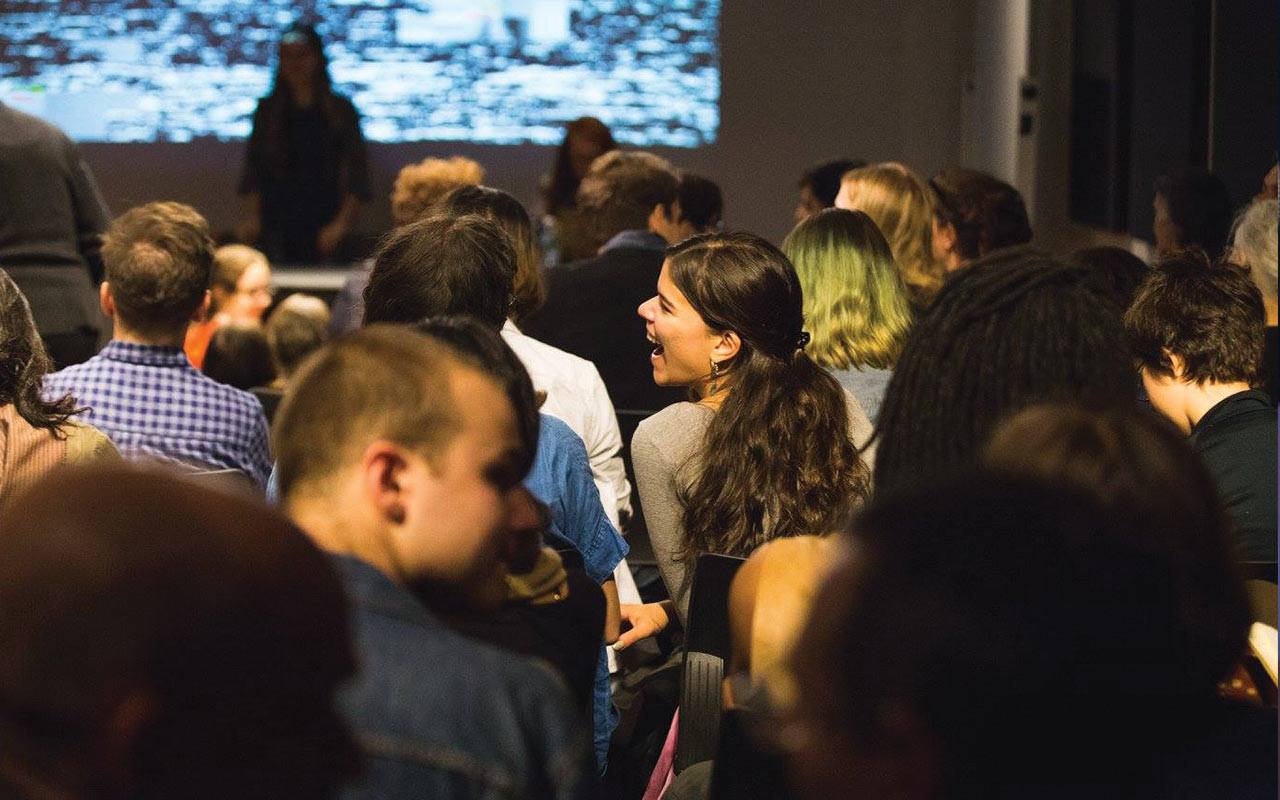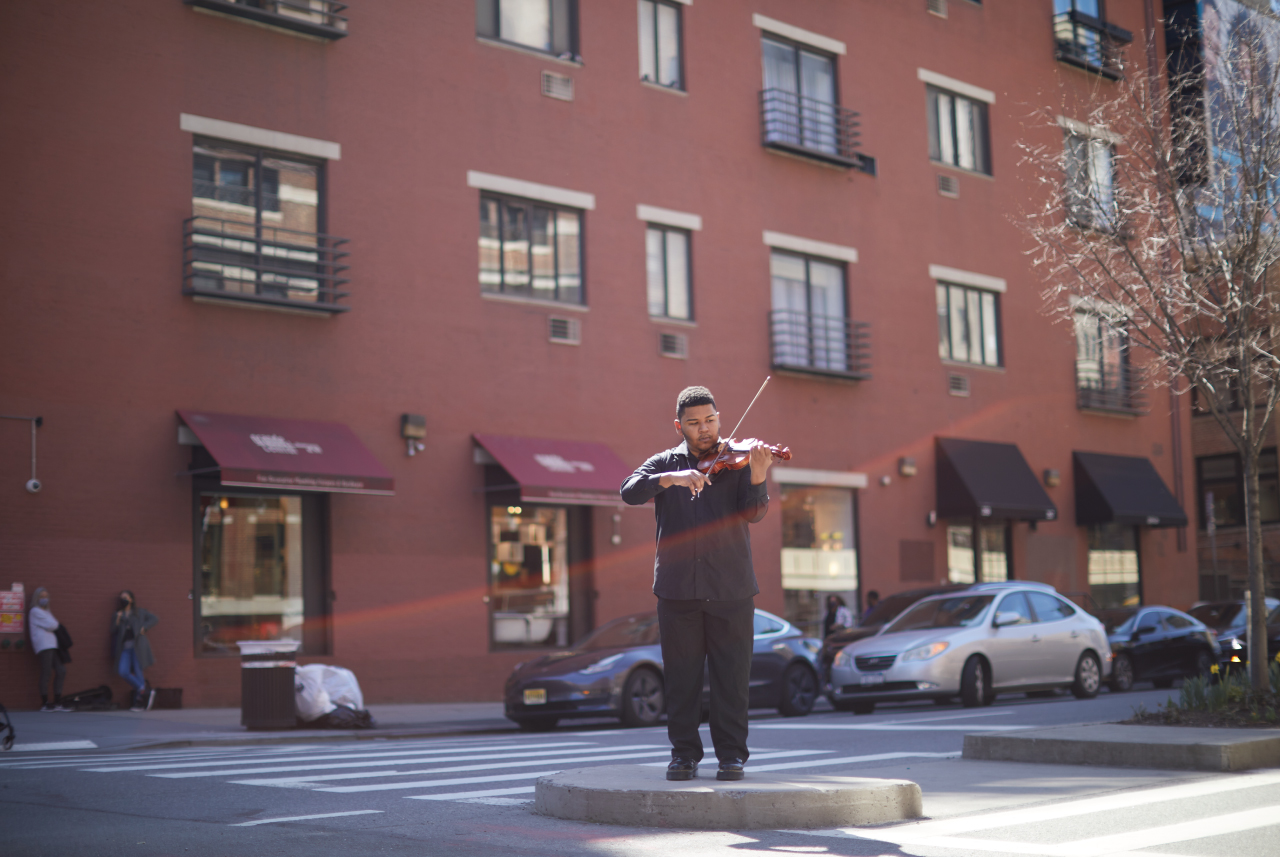
Bright lights. World-class musicians. World-famous venues. In New York City, anything is possible. For students in the six instrumental performance programs at the NYU Steinhardt School of Culture, Education, and Human Development, the possibilities are tenfold. The recipe for success is equal parts academics and performance, says professor and director of the String Studies program Stephanie Baer. To navigate the 21st-century music scene, students need real-world experiences in the classroom and on stage. That is why instrumental performance programs—from their place within the Department of Music and Performing Arts Professions (MPAP)—cultivate so much more than a traditional conservatory education.
“The conservatory education hasn’t changed much since 1850, except for maybe the repertoire,” says Professor Baer. “After conservatory, there are a limited number of careers you can go into. NYU’s instrumental performance programs are different because they prepare students for the modern world. Students come here with an idea of what they want to do. And because of the breadth of classes we offer, they receive the training, experience, and knowledge to hit the ground running when they graduate.”
A Well-Rounded Education Is Instrumental
In the instrumental performance programs at NYU—which include majors in Piano Studies, Woodwind Studies, Jazz Studies, Percussion Studies, String Studies, and Brass Studies—students take core courses in music theory, music history, and aural comprehension alongside liberal arts courses in writing, social science, and quantitative reasoning. While each major has its own additional requirements, all instrumental performance students can take a range of electives both inside and outside their department. “Instrumental performance students are very inquisitive and entrepreneurial,” says Professor Baer. “They take courses in music business, music technology, and music education. Many minor and a lot even double major in areas like prehealth, computer programming, and engineering. At NYU, we offer the serious academics that conservatories don’t really have.”
Other big differences between NYU and traditional conservatories? Study abroad experiences in Prague and Paris. Internships at the Met Opera Guild and the New York Philharmonic. And volunteer opportunities with underserved communities in the South Bronx. Regardless of their specialty, instrumental performance students at NYU have access to everything they need to thrive in the 21st-century music scene.
Master Every Aspect of the Eighty-Eights in Piano Studies
When she was a child, Brielle Perez dreamed of going to college for music. “I developed an inherent passion for piano and since then have studied classical music in great depth,” says the Piano Studies major. Although Brielle initially envisioned herself going to a conservatory, she ultimately chose the instrumental performance program at NYU because of the freedom it gave her to explore and pursue her musical interests.
In addition to core courses, piano studies students master all 88 keys of a piano through classes on piano literature, private lessons with artist faculty, and chamber music credits. They study the historical repertoire of composers like Beethoven, Chopin, and Liszt, but they also take classes like Performance Practices and Entrepreneurship in 20th- and 21st-Century Piano Music to explore music by lesser-known composers, especially women and Black and Indigenous people of color.
Gabriel Oldfield, a piano performance student, appreciates how his professors recognize the value of contemporary music—a sentiment he thinks is missing at other institutions. “After performing in different music ensembles at NYU, I realized that the standard repertoire leaves so much out,” he says. “Many of the Piano Studies faculty commission and premiere new works, which I think is necessary to keep our music and instrument relevant. They really encourage you to perform at the edge of what the standard repertoire has to offer.”
Beyond their piano-focused classes, students can enroll in a range of electives to explore their interests even further. They can take secondary lessons in jazz or composition, collaborate with the NYU Broadway Orchestra, or perform in the NYU Baroque Ensemble. They can take courses in music therapy and music education or prepare for a career in the music industry by minoring in the Business of Entertainment, Media, and Technology at the NYU Stern School of Business.
Students also have myriad opportunities to master their instrument through performance. Like Brielle, many students perform in chamber groups, master classes, and studio classes. They also have chances to perform with graduate-level song repertoire classes and compete in the annual piano concerto contest. As if that weren’t enough, they can participate in one of the program’s multiday piano festivals—like the five-week virtual celebration of Beethoven’s 250th birthday, recognized by the Washington Post as one of the most exciting online events of the fall 2020 season.
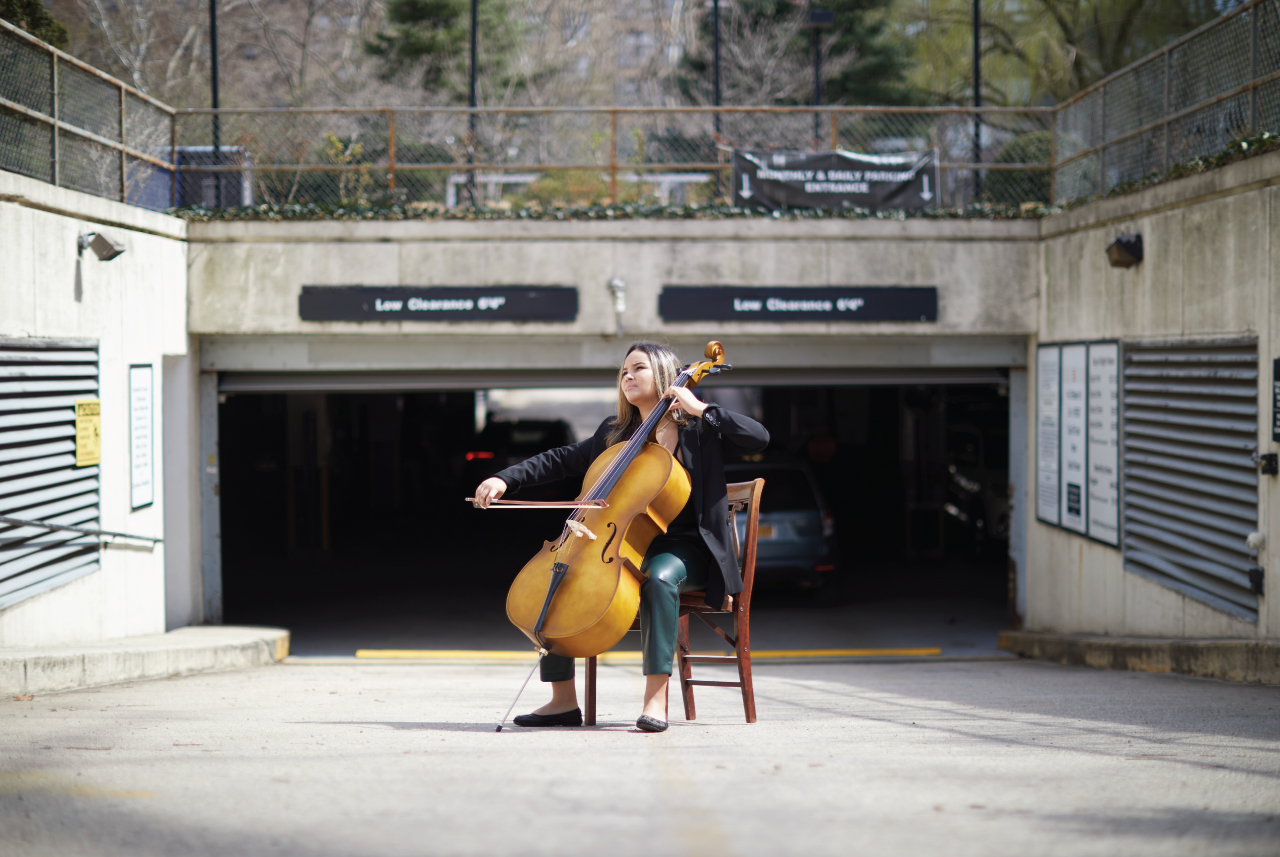
Woodwind Studies Brings a Breath of Fresh Air
As a young woodwind doubler, Ben Schonhorn aspired to play in a Broadway pit orchestra. After researching colleges and submitting applications, Ben ultimately chose to major in Woodwind Studies with a concentration in multiple woodwind performance at NYU. The opportunities available in the University’s unique orchestra ensembles were the driving force behind his decision. “During the Broadway Winds summer program, I learned about the classes that woodwind doublers could take at NYU to continue their studies,” says Ben. “NYU was the only school I was looking at that had a Broadway orchestra. Since my dream is to play on Broadway, the choice was pretty obvious.”
In addition to the NYU Broadway Orchestra, Ben has performed with the NYU Symphony and NYU Saxophone orchestras as well as a woodwind octet for a composition class, a chamber orchestra for a conducting class, and a woodwind quartet. He has even performed at the Unsilent Film Festival and Pulsing and Shaking, events held by the NYU Composers Collective club. All of this during his first two semesters at NYU.
The opportunities don’t stop there. Woodwind studies students have the chance to attend master classes with professional musicians, weekly meetings with business gurus and performers in the music industry, and private lessons with world-renowned faculty who, as Professor and Director of Woodwind Studies Matt Sullivan says, have direct connections with the performance world. “The connections of our instrumental faculty are numerous and extraordinary,” says Professor Sullivan. “Many of our graduates are working in the field. When they need a sub, they call on current students.”
Throw the Script Away in Jazz Studies
Because NYU is located in the heart of Greenwich Village, jazz studies students are just steps away from some of the most famous jazz clubs in the world—like the Village Vanguard, Blue Note, and Smalls. They also have access to NYU’s own state-of-the-art jazz facilities and the James L. Dolan Music Recording Studio.
In addition to fundamental courses in jazz history, jazz theory, and jazz improvisation, jazz students also take a wide range of world music classes that explore Chicago blues, Balkan music, and Afro-Cuban and Brazilian music. They also receive private lessons, participate in jazz ensembles, and attend weekly seminars with leading jazz musicians.
And performance opportunities are never in short supply. Jazz Studies major Olivia Hughart played a lot of gigs on campus during her first year at NYU. “In addition to performing at a lot of private functions, I played gigs with upper-level students in their own individual performances and I played a reed book in the Tisch New Theatre’s production of Legally Blonde,” she says.
Off campus, jazz students perform at world-renowned venues such as Dizzy’s Club and Provincetown Playhouse. They participate in live broadcasts for jazz radio stations in New York City and perform at the Jazz Education Network Conference. They even perform internationally in countries like Peru, Estonia, Ghana, and Italy. What’s more, many jazz studies students sharpen their craft and gain invaluable experience through internships. Previously, students have worked at recording studios, management agencies, and jazz clubs around the city as well as at TV shows like Saturday Night Live.
Build the Beat of Opportunity in Percussion Studies
Percussion studies students at NYU focus on a much more expansive repertoire than they would in a typical percussion program. This is one of the many reasons Percussion Studies major Adriana Harrison chose to study here.“At NYU, students can learn traditional orchestral and chamber music. But they can also learn Broadway, steelpan, Afro-Cuban, and West African music,” she says. “I chose the Percussion Studies program at NYU because I saw the most opportunity here.”
Percussion Studies promotes and honors music that many programs tend to overlook, such as the aboriginal music that greatly influenced the Western world. To broaden their skill set and develop their knowledge of global percussion, students participate in NYU Steel, one of the only university-based Trinidad and Tobago steel drum ensembles on the East Coast.
Percussion students also spend at least one semester performing in the African Gyil and Percussion Ensemble, led by faculty member Valerie Naranjo. “This ensemble has been one of my favorite classes,” says Adriana. “I’ve learned how to play traditional West African instruments like the djembe, shekere, and the gyil as well as the songs and dances that correlate to the music we learn. I’ve become a more well-rounded musician because of this experience.”
Weekly master class sessions with world-class percussionists, collaborative work with music theory and composition students, and private faculty lessons are mainstays in Percussion Studies. As are a full array of performance opportunities. Students commonly perform with NYU Steel, the NYU Percussion Chamber Music Ensemble, and the University Concert Band. They can also participate in recording sessions with music theory and composition students concentrating in screen scoring, an opportunity that Adriana has taken advantage of. “During these sessions, we sight-read brand new compositions from some of the best NYU film composers and became a part of their soundtrack,” she says. “Although these sessions are tiring, they’ve been some of my favorite musical experiences here.”
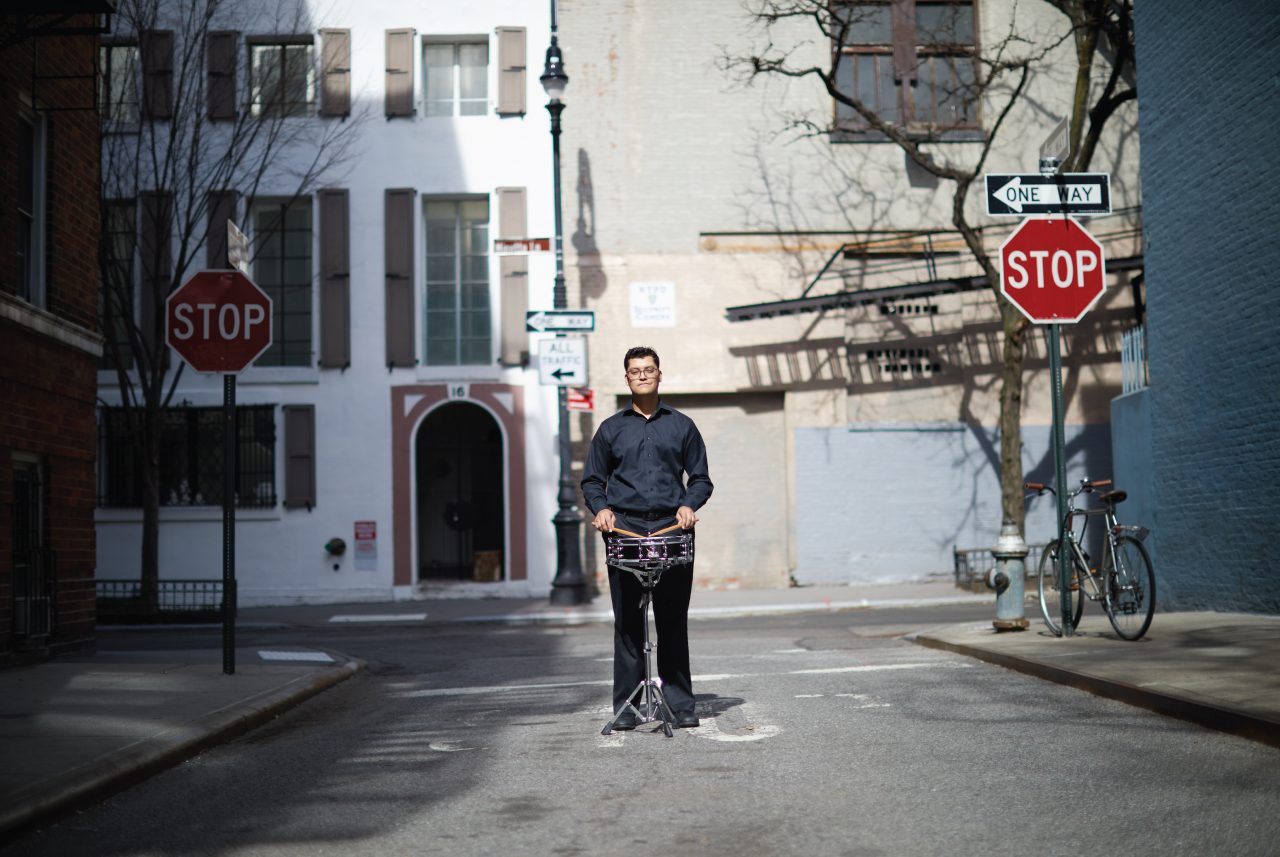
Rise to a Crescendo in String Studies
String Studies major and cellist Yasmine Kocan enrolled in the instrumental performance program at NYU because she wanted a diverse education—one where she could earn a music degree and still explore other subjects. “Conservatories tend to have ‘academic’ classes, but they all usually relate back to music,” says Yasmine. “I really liked the idea of studying music and still having the chance to earn a well-rounded education at the end of four years.”
In addition to conservatory-style training in solo, chamber, and orchestral string repertoire, string studies students participate in chamber ensembles, attend master classes, and learn one-on-one with faculty. Their in-class work is supplemented by a vast array of performance opportunities, including with the NYU Symphony, the NYU Chamber Orchestra, and the NYU Broadway Orchestra. Many string students also perform with the NYU Contemporary Music Ensemble, which debuts works from graduate students in the Music Composition program. And there are always opportunities to collaborate with vocal and screen scoring students.
All these performance opportunities have helped Yasmine improve her playing by leaps and bounds. “When I came to NYU, I had a lot of performance and recording anxiety,” she shares. “I would shake from the nerves and it would show in my playing. But I’ve done so much performing and recording here that it’s become second nature to me.”
Brass Studies Brings the Shine and Sparkle
Along with their core music courses, brass studies students explore the broad repertoire for brass and piano, perform in numerous chamber ensembles, and hold both junior- and senior-year recitals. They also take private lessons with faculty members who regularly perform with the New York Philharmonic, the American Brass Quintet, and Broadway pit orchestras.
Beyond their academics, students master their instruments through regular performances with the NYU Brass Choir and the NYU Chamber Orchestra as well as smaller, student-formed chamber ensembles, from trios to quintets. They also let their instrumental performance shine in a tremendous range of student-staged and student-directed productions, including operas, musical theatre shows, and films. “In just six semesters at NYU, I’ve played in the University Concert Band, the Brass Choir, the Chamber Orchestra and Broadway Orchestra, a brass quintet, and the All-University Jazz Ensemble, and I have sung with the University Singers,” says Dante Guinta, who is studying trombone performance. “I’ve also performed at Carnegie Hall with the New York Youth Symphony and played in an NYU student-run production of Urinetown.”
Brass students also frequently venture off campus to see and learn from professional musicians in their natural habitats, from Met operas to Carnegie Hall orchestral concerts. But just as often, when professional musicians travel through the city, they’ll stop by campus to give a performance and teach a master class. Members of the Montreal Symphony Orchestra, Chicago Symphony Orchestra, and Los Angeles Philharmonic have all spent time in NYU studios and classrooms, showing students a lot of what they know. Recently, world-renowned trumpeter Sergei Nakariakov popped in to perform for students and share his experience in the music industry. “He uplifted and changed the mindsets of all the students who were there,” says Professor Wayne DuMaine, who is also the director of the Brass Studies program.
NYU Broadway Orchestra: It Couldnʼt Happen Anywhere Else on Earth
The NYU Broadway Orchestra offers a full-fledged exploration of the most famous theatre district in the world—in the city it calls home. In this orchestra students from all instrumental performance programs come together to study and perform pieces from some of Broadway’s most well-known and revered productions, such as Guys and Dolls, Anything Goes, and Hairspray.
They also serve as the pit orchestra for musical productions hosted by NYU Vocal Performance majors. Broadway Orchestra gives students an utterly unique opportunity to develop a multitude of specialized skills to flourish in their careers. They learn how to sight-read and record music. They learn about the business side of Broadway productions and gain a new understanding of what it takes to actually stage a Broadway show. But most importantly, they connect with, learn from, and work with legendary composers, conductors, and performers who have made, and continue to make, their name on Broadway.


